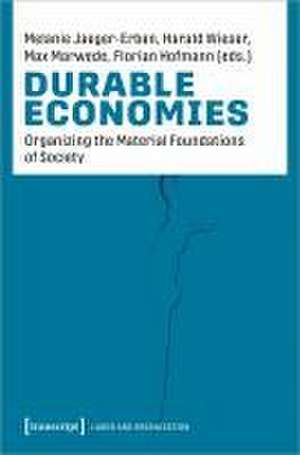Durable Economies: Arbeit und Organisation, cartea 10
Editat de Melanie Jaeger-Erben, Harald Wieser, Max Marwede, Florian Hofmannen Limba Engleză Paperback – 30 sep 2023
Preț: 212.17 lei
Nou
Puncte Express: 318
Preț estimativ în valută:
40.60€ • 42.50$ • 33.79£
40.60€ • 42.50$ • 33.79£
Carte disponibilă
Livrare economică 06-12 martie
Livrare express 22-28 februarie pentru 27.34 lei
Preluare comenzi: 021 569.72.76
Specificații
ISBN-13: 9783837663969
ISBN-10: 3837663965
Pagini: 252
Ilustrații: 7 SW-Abbildungen, 22 Farbabbildungen
Dimensiuni: 146 x 220 x 16 mm
Greutate: 0.39 kg
Editura: Transcript Verlag
Seria Arbeit und Organisation
ISBN-10: 3837663965
Pagini: 252
Ilustrații: 7 SW-Abbildungen, 22 Farbabbildungen
Dimensiuni: 146 x 220 x 16 mm
Greutate: 0.39 kg
Editura: Transcript Verlag
Seria Arbeit und Organisation
Notă biografică
Melanie Jaeger-Erben (Prof. Dr. phil.), born in 1977, heads the department of Sociology of Technology and the Environment at the Brandenburgische Technische Universität Cottbus-Senftenberg. Her main research interests are social science technology research, sustainable production and consumption systems, and social innovation.
Harald Wieser (PhD), born in 1990, is a senior researcher at the Austrian Institute for SME Research (KMU Forschung Austria). The trained ecological economist and economic sociologist did his doctorate at the University of Manchester. His research explores how policy can shape large-scale socio-economic transformations.
Max Marwede (Dr.) is design lead at Fraunhofer-Institut für Zuverlässigkeit und Mikrointegration in Berlin. His Circular Design Team supports companies in designing sustainable products, services, and ecosystems and in developing new circular design tools and processes. In 2022, he obtained his PostDoc in the inter- and transdisciplinary Junior Research Group »Obsolescence as a challenge for sustainability - causes and alternatives« at the Technische Universität Berlin.
Florian Hofmann (Dr.) is a researcher and consultant at the Brandenburgische Technische Universität Cottbus-Senftenberg. His work at the department of Sociology of Technology and the Environment focuses on the circular economy and transitions to sustainable futures. From 2017 to 2022, he was a member of the inter- and transdisciplinary Junior Research Group »Obsolescence as a challenge for sustainability - causes and alternatives« at the Technische Universität Berlin.
Harald Wieser (PhD), born in 1990, is a senior researcher at the Austrian Institute for SME Research (KMU Forschung Austria). The trained ecological economist and economic sociologist did his doctorate at the University of Manchester. His research explores how policy can shape large-scale socio-economic transformations.
Max Marwede (Dr.) is design lead at Fraunhofer-Institut für Zuverlässigkeit und Mikrointegration in Berlin. His Circular Design Team supports companies in designing sustainable products, services, and ecosystems and in developing new circular design tools and processes. In 2022, he obtained his PostDoc in the inter- and transdisciplinary Junior Research Group »Obsolescence as a challenge for sustainability - causes and alternatives« at the Technische Universität Berlin.
Florian Hofmann (Dr.) is a researcher and consultant at the Brandenburgische Technische Universität Cottbus-Senftenberg. His work at the department of Sociology of Technology and the Environment focuses on the circular economy and transitions to sustainable futures. From 2017 to 2022, he was a member of the inter- and transdisciplinary Junior Research Group »Obsolescence as a challenge for sustainability - causes and alternatives« at the Technische Universität Berlin.






